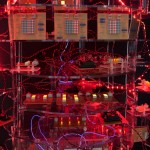Many late night discussions over the last year from FOWA, IT@Cork, eTech, Green:net to Geekyoto, and with the AMEE team have led me to think on topics like
- “digital inheritance”
(e.g. what if you could inherit your grandfather’s iPod?) - dematerialisation
(digital products and products transforming into services) - desiring what we need
(as opposed to the consumer movement that drove us from a needs-based culture to a desire-based culture) - modelling flow rather than inflation
- and change and adaptation in an elastic society
(to redefine the notion of “growth”)
Far, far too much to try and summarise here, but hopefully good springboards for discussion. A recurring theme is the transformation from products to services (eg. the instant car rental schemes where you can rent for 30 mins). Digital music has already dematerialised the physical product of music to replace CDs.
Inspired by the powers of ten, I’ve been wondering how in the world might make the 90% reduction in CO2/GHGs that’s required to address climate change. This is an order-of-magnitude change in the way we currently live.
We need to all make “powers of ten” changes to our lives, from the CO2 intensity of our power production, to the way we relate to products and services.
So, to my latest call to action…
“Turn every product into a service for 10 people”
I’ve christened this Δten / Δ10 / Delta Ten, so it can be talked about in those management consulting meetings where 6σ (Six Sigma) is mentioned.
In fact, maybe Delta Ten should be an add-on to Six Sigma?
“Delta Ten seeks to improve the sustainability of process outputs by identifying and removing the causes of inefficiencies (errors) and variation in manufacturing and business processes, and extends this to usage patterns (e.g. resource sharing and re-use), consumption and waste, by using strong reductionist techniques to diminish the use of energy and materials by a factor of ten.”
- delta 1 = 10% efficiency increase (10% reduction in materials, increase in energy efficiency, or energy consumption through re-use)
- …
- delta 9 = 90% efficiency increase (90% reduction in materials, increase in energy efficiency, or energy consumption through re-use)
- delta 10 = The process is rendered wholly and demonstrably sustainable through the effective and credible management of resources (e.g. renewable energy, managed forestry, effective waste management, and cradle-to-cradle/biomimetics).
A delta 10 means you have created an environmentally-intelligent service, not a product.
Anyone like to help?




